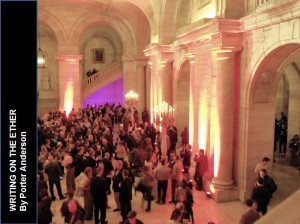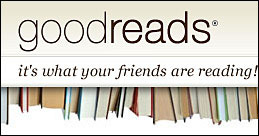Jane Friedman's Blog: Jane Friedman, page 194
March 7, 2012
How to Identify Top Websites & Blogs in Your Category

Flickr / Marcel Germain
I often advise new bloggers to identify the top blogs or communities for their target audience, and build relationships with those bloggers. (Don't see blogging as a competition. It's a community.)
It's also a good exercise for an author who wants to build platform or promote a book to the right audience.
But then the question arises, how do you identify the top websites and blogs in your category or for your audience?
Here are free methods and resources you can use. Don't rely on any single resource—try them all. You'll get different results.
Delicious. Search by combining as many keywords as needed for your target audience (using a plus sign), e.g., romance+erotica.
Technorati (blog index). Drill down by whatever category best fits your audience or type of work. Or, click here for the books category.
StumbleUpon . It can be frustrating to search this systematically, but give it a shot. E.g., the first result to come up during a "romance" search is All About Romance, which is one of the top-ranked sites appealing to romance readers.
AllTop . You can search by keyword or browse categories.
Twitter . Using Twitter's recommended follows by category, you can identify influential people, then visit their site and see who they follow and recommend. Alternatively, try WeFollow.
Google . Try searching for "top blogs" + keywords for your audience or category. Imagine what your target audience might search for, and see what Google uncovers. You can also try "top 10 blogs for XYZ." Top 10 lists are exceptionally common and popular.
Try the blog awards. The two most common are the Webby Awards and the Bloggies, but such awards typically don't drill very deep into a category or audience, which makes them less helpful for authors.
Blogrolls. Once you've identified a few top sites or blogs, check their blogrolls or resource lists to find others.
Finally, crowdsource an answer. If you use Twitter, Facebook, or another community site, post a question soliciting other people's favorite sites and blogs.
With No. 9 in mind, I hope you'll share your favorite techniques for uncovering the top blogs or sites for a specific category or audience.
March 2, 2012
Doubting Your Work? An Excellent Sign!
Here's an absolutely fabulous and honest piece by Eugene Cross about what it feels like to study writing as an undergraduate/graduate.
It reminds me of how I hoped, wished, dreamed that one of my professors would tell me, "You're one of the students who really does have the gift. YOU should write."
That never happened. And I'm glad it didn't, because it wouldn't have been enough. Nothing is ever really enough. (And talent or passion aren't enough.)
But let's hear from Cross:
[C]omparing was what I did. Constantly. I was convinced that each class I enrolled in held only two or three "real" writers and that I was never among them. I perpetually worried about whether or not my stories lived up to those of my classmates when what I should have been worrying about was whether or not they lived up to themselves. What they were capable of becoming. I was consumed with doubt. Was it possible that I had found my calling only to discover that I really sucked at it? Could the world be that cruel? I was certain it could.
You must click here to read the entire piece—part of this month's Glimmer Train bulletin.
February 29, 2012
The Tech-Empowered Writer (AWP Panel Resources)
This week I'll be in Chicago for the Association of Writers & Writing Programs annual conference. I'm a panelist on "The Tech-Empowered Writer" on Thursday at 1:30 p.m. This post serves as a handy resource for anyone who attends the panel, plus all of you who will miss it.
Think beyond the [analog] book
Traditional authorship focuses on the traditional publication of books or articles, with everything else viewed as ancillary. This is very narrow or limited thinking when considering how many ways a message or story can be spread in today's tech-driven world.
How can your story or message be adapted, expanded, or shared across a variety of media?
Think broadly about your strengths to reach and engage with readers across a variety of channels.
The future of reading does not equal the future of print. Don't limit yourself to books/articles/text. Consider how you can offer diverse experiences.
Diverse experiences might involve:
Videos
Podcast / audio
Livecasting
Screencasts, webinars, and online tutorials
In-person events or experiences
Online education and curriculum
Online communities
Websites and blogs
Electronic newsletters and serials
Mobile and tablet applications
Digital downloads
Wikis
Brainstorm questions
How do people typically or conventionally experience your writing or teaching?
Where and when do they typically experience it or consume it?
Could your work be adapted into mediums that are more convenient or powerful for your readers?
What kind of interaction or customization is possible?
How could your content be amplified or expanded online?
Video & audio
YouTube is the No. 2 search engine. Think about that for a minute. Nearly all major companies have their own branded channel on YouTube. You can too.
Most people will not watch a video more than a few minutes long. For long videos, provide timestamps of when certain questions/issues are discussed.
Anyone can distribute a podcast for free via iTunes. Consider: There are many people in this world who consume their content strictly via audio (due to a long commute and/or active lifestyle).
Live shows can be produced through BlogTalkRadio.
You can also do "microcasts" through services like AudioBoo and CinchCast (available as smartphone apps for recording interviews on the go).
Google Hangouts: Free instant video chat group with whomever you'd like to invite who's a Google Plus user. All you need is a webcam.
Other content/multimedia tools to consider
Blurb Mobile. Tells stories through photos, video, and audio that you've captured through your iPhone.
Cowbird. Tell stories like you've never told them before. (You'll have to go experience it; not like any other storytelling tool I've seen.)
Jing (Screencast). Record what's happening on your screen, along with audio.
iBooks Author. Create multimedia e-books with Apple's free software. Uses drag-and-drop functionality—you don't need to be a programmer, but you must be a Mac user.
PressBooks. Create e-books that live online and/or create books that you can export as EPUB files (standard e-book format).
Slideshare. Share slide-based presentations.
Ustream. Stream video live from anywhere (even from your smartphone).
Broadcastr. Record stories tied to a specific geographic location.
PBWorks. Create a wiki to collaborate with others, either publicly or privately.
Scribd. Easily share or distribute PDF documents, either free or paid.
MailChimp. Start a professional looking e-newsletter, for free up to 2,000 names.
FourSquare. Create themed lists of places you love, anywhere in the world. Must be a FourSquare user.
Easy site-building tools
Click here to read my e-newsletter on this topic. Three helpful tools you should be aware of:
WordPress (can support a full-fledged website, but easy enough for a one-page site or simple blog)
Tumblr (lightweight and easy)
About.me (for a splash page)
Curation: Sometimes a better option than creation
The world's information is doubling every two years. Sometimes, it's better when we avoid adding to the noise, and instead make sense of what already exists.
Kevin Sablan: "Curation is not simply the act of collecting disparate items and sloppily slopping theme together."
Curation is a service. It provides context and analysis, and helps people discover things they might not have found on their own. It should probably save people's time, or otherwise entertain and delight.
Everyone is a curator to some extent. Think about what you choose to post on Facebook or share on Twitter. You're making selections for a specific audience.
Specific and popular curation tools: Tumblr, Storify, Paper.li, Scoop.it, Pinterest
Some of my posts that might help you
Build a More Effective Author Website
10 Questions to Ask Before Committing to Any E-Publishing Service
3 Free Books to Open Your Eyes to the Future of Authorship
12 Must-Read Articles From 2011 (where I link to articles by other people, mostly dealing with issues related to new media and authorship)
5 Keys to Writing for an Online Audience
February 28, 2012
Authors: Don't Pay Money for BEA Book Promotion

BookExpo America (BEA)
Update
I wrote the following post as a warning to self-published authors who may fall prey to scams that take advantage of the highly recognized industry trade show, BookExpo America (BEA).
I want to emphasize that BEA itself is not involved in author scams of any kind. Quite the opposite. According to BEA events director Steven Rosato, BEA has banned a number of entities who were re-selling BEA opportunities at premium. He wrote me via e-mail, "One example [was] a PR company charging $1,500.00 for a spot they were paying $75.00."
In other words, BEA attempts to educate and protect authors from making the kinds of mistakes I discuss below.
Unfortunately, some readers drew incorrect conclusions from the post headline, did not read and understand the post, and/or did not see the comments that have extended the discussion.
In issuing this update, I hope my position is clarified.
This advice is for self-published authors, independent authors, and possibly traditionally published authors who seek to hire assistance in the marketing and promotion of their books.
Do not pay to have your book "promoted" at BookExpo America (BEA) by a third party. It is not worth the money, not even a little. I say this having attended BEA for seven years straight, as part of a traditional publishing house team.
Why?
BEA does not favor indie title promotion. It is a New York industry event where traditional publishing insiders talk to other traditional publishing insiders. Yes, there are librarians and booksellers, but I can guarantee you they're not paying attention to the places where your book is "promoted."
Nobody is going to notice your book there. Your book is likely to be "promoted" with many other books, with no way of attracting attention even if someone did pause for a second within 50 feet of your book. Imagine setting a copy of your book down in the world's largest book fair, and expecting someone to not only notice it, but be entranced by it so much they can ignore 10,000 other things happening at the same time.
If you—the author—are not present to advocate for it, your book doesn't stand a chance. Services that offer to promote your book at BEA will not be hand-selling or promoting your book in a meaningful way. But they will be happy to cash your check and say that your book had a "presence" at BEA. If you want to satisfy your ego, go ahead. But it's not going to lead to sales.
BEA is a quality industry event, and it is a legitimate marketing and promotion opportunity for many authors and publishers. But I do not recommend any self-published or independent author pay a third party for BEA promotion.
If you're now wondering: What exactly is BEA, then read my previous posts:
My 2007 overview of what BEA is all about—a guest post at Identity Theory
3 Reasons Why You Should Never Pitch at BEA
I challenge anyone in the comments to provide evidence that a self-published book gained traction at BEA because the author paid a fee to secure placement (and the author was not present).
February 27, 2012
Build a More Effective Author Website
by Robert Hruzek / Flickr
Every author website should include these elements, whether on the homepage or elsewhere.About/bio page. I recommend a brief, professional bio (250 words or less), and a photo. You can expand in many different ways, but a short bio upfront is very helpful and essential for those looking for the quick facts.
Information on your books, products, and services. You might have a separate page for each book or product, or you might combine everything together. Regardless, don't skimp on the details, and always include links to where your books can be purchased in both print and digital form. Ideal: A downloadable press or media kit for each book.
Social media integration. Let readers know where else you're active online, and make your site easy to share (using social share buttons, like you see on this site).
Social proof. If you have notable media coverage, good reviews, positive testimonials, or a significant following on a specific platform (e.g., Twitter), let it be known.
E-mail/RSS subscription or sign-up. Make it easy for people to subscribe to your blog via e-mail/RSS (here's how). If you don't have a blog, then offer an e-mail newsletter. (Give people a way to stay connected!)
Here are mistakes I often see on author websites:
No way to sign up for updates. If people visit your site once, they may not ever return. But that doesn't mean they aren't interested in receiving news from you. Always offer an easy way for people to be notified when you have news or content to share.
Too many pages or paths. New visitors to your site will not likely visit more than a couple pages of your website. Make it clear on your homepage what's important by having a clear "call to action." (What do you most want people to do when they visit?) Don't build your site for you—build it for your future readers.
Heavy images, intro pages, Flash, etc. If your site takes a long time to load, or requires special plug-ins, or doesn't work on an iPad (Apple does not support Flash), you will lose a chunk of your visitors.
No clear contact info. Make it easy for people to e-mail you or find you on social networks. That's why you have a website, right?
Unfriendly to mobile devices. Nearly two-thirds of my new site visitors are on a mobile device. Thankfully, my WordPress theme is mobile-friendly. Is your website mobile friendly? (If you're using WordPress, all you need to do is install the free plug-in, WP Touch.)
For related posts:
The Big Mistake of Author Websites and Blogs
Why You Should Add E-mail Subscription Service to Your Blog
3 Numbers That Matter to Your Platform
Get Started Guide: Blogging for Writers
Please Don't Blog Your Book: 4 Reasons Why
February 24, 2012
Back to Basics: 5 Keys to Online Writing
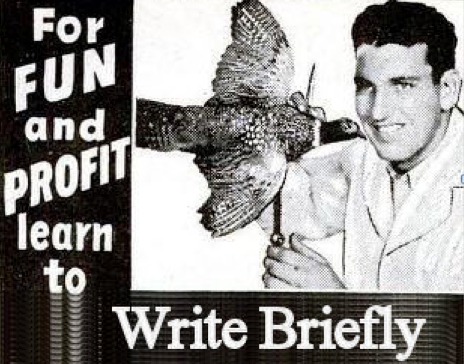
From our friends at Brevity
Over at Writer Unboxed, where I'm a monthly contributor, I'm breaking out the principles I teach my university students:
5 Keys to Writing for an Online Audience
The 5 keys are:
Brevity is your friend.
Make your content scannable.
Clear and direct headlines get more clicks.
Categorize, tag, and annotate your content wherever you go.
If search engines can't find you, then you don't exist.
February 22, 2012
Authors: Don't Pay Money for BEA Book Promotion

BookExpo America (BEA)
This advice is for self-published authors, independent authors, and possibly traditionally published authors who seek to hire assistance in the marketing and promotion of their books.
Do not pay to have your book "promoted" at BookExpo America (BEA). It is not worth the money, not even a little. I say this having attended BEA for seven years straight, as part of a traditional publishing house team.
Why?
BEA does not favor indie title promotion. It is a New York industry event where traditional publishing insiders talk to other traditional publishing insiders. Yes, there are librarians and booksellers, but I can guarantee you they're not paying attention to the places where your book is "promoted."
Nobody is going to notice your book there. Your book is likely to be "promoted" with many other books, with no way of attracting attention even if someone did pause for a second within 50 feet of your book. Imagine setting a copy of your book down in the world's largest book fair, and expecting someone to not only notice it, but be entranced by it so much they can ignore 10,000 other things happening at the same time.
If you—the author—are not present to advocate for it, your book doesn't stand a chance. Services that offer to promote your book at BEA will not be hand-selling or promoting your book in a meaningful way. But they will be happy to cash your check and say that your book had a "presence" at BEA. If you want to satisfy your ego, go ahead. But it's not going to lead to sales.
If you're now wondering: What exactly is BEA, then read my previous posts:
My 2007 overview of what BEA is all about—a guest post at Identity Theory
3 Reasons Why You Should Never Pitch at BEA
I challenge anyone in the comments to provide evidence that a self-published book gained traction at BEA because the author paid a fee to secure placement (and the author was not present).
February 16, 2012
Writing on the Ether
Tools of Change Conference attendees are welcomed at a reception at the New York Public Library on 13 February. Photo: Porter Anderson
ToC: Techno-calities
Locution, locution, locution.
In its sixth year, the Tools of Change Conference — just closed in New York City — easily held its own as one of publishing's two great confabs of a stressful year, the other being last month's Digital Book World Conference + Expo.
And when it comes to locution, ye shall know them by how they say "data."
January's DBW (#dbw12) used "following data" to tell us where things lie (not lay, damn it) amid the sinkholes of today's treacherous, fast-digitizing landscape.
February's ToC (#TOCcon) vowed to wield "Big Data" as a photon torpedo, LeVar Burton, in the battle for publishing's cultural viability.
Burton gave a Treky's keynote on Tuesday in which he revealed that spotting Nichelle Nichols on the original bridge of Gene Roddenberry's USS Enterprise helped him find his race and place in an entertainment industry that would later cast him in Alex Haley's pivotal "Roots" and now platforms his RRKidz mission to get digital reading to kidz (not kids, damn it).
Cocktails at one of my favorite joints on the planet! http://t.co/Ryi2u3L3[image error]February 13, 2012 8:29 pm via Twitterrific Reply Retweet Favorite LeVar Burton
Speaking of race, another adherent of Lt. Uhura's persuasion, author and Onionist Baratunde Thurston, gave another keynote that day, plugging his book.
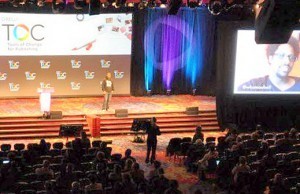 Here is his keynote on video. Here he is with Terry Gross on NPR's Fresh Air, in Baratunde Thurston Explains "How To Be Black" And here is his book in an enhanced edition, "enhanced" being a term we include less and less frequently in our publishing patois.
Here is his keynote on video. Here he is with Terry Gross on NPR's Fresh Air, in Baratunde Thurston Explains "How To Be Black" And here is his book in an enhanced edition, "enhanced" being a term we include less and less frequently in our publishing patois.
I want to help. "@about 22 hours ago via Twitter for iPad Reply Retweet Favorite Pablo Defendini
More locution: ToC and DBW are perfectly aligned, like squirming twin Cupids, in their use of the term "keynote." It once referred to an often long, always singular, rabble-rallying speech by a major figure of real heft. You remember Margaret Atwood at last year's ToC? Well, of course you do. And you can refresh your memory when she does it again at AWP in early March.
Today? Every girl can give a keynote. In fact, every girl and every boy targeted by arrows this Valentine's Day seemed determined to do just that. A "keynote" now lasts 15 minutes, max. And it arrives in a candy box full of matching presentations, each of them crinkly-wrapped in the visuals that we Contemporary People must behold in order to focus, damn it, focus. The givers of today's "keynotes" are frequently low-energy folks whose first calling in life clearly is not oration. They want to tell us that their software is better than your software.
They may be right. They may be wrong. They may be sponsors. And one of them at ToC hid envelopes under the audience's seats. Ten of those envelopes, we were told, would provide the lucky derrieres above them with iPad 2′s.
Did I mention locution? It's all in how we say it, you see.
Immediate reaction to entering the #TOCCON registration area - there are way more women attendees than most tech confs I've been to lately.[image error]February 13, 2012 8:42 am via Twitter for iPhone Reply Retweet Favorite Dan York
Let's have one more.
"Scaling" could mean something less friendly to some soon.
A Wednesday session, Scaling Content Development Through Automation, gave us Kristian Hammond of Narrative Science and Robbie Allen of Automated Insights in their talks on those computer-generated sports and real-estate reports you may have heard about, ex machina.
These punchy accounts of youth hockey matches and other pivotal events are generated, Hammond told us, by "a simple set of derivations from the data." Then "angles" are applied, he said. And he was at pains to tell us, "We're not writing stories that just express the data…the system understands the trend."
For the record: This report is written not by a machine but by a human being made productive by caffeine rather than electrical current. Parse me, bubba, I've got yer data right here.
But 'tis bootless to exclaim.
By the time the last flotilla of petit-four-sized keynotes eased us all to sleep in our seats on Wednesday afternoon — never let the agile thinker Theo Gray onto a stage right after lunch to show you his Wolfram Mathematica CDF — Ed Nawotka managed to fire up his Publishing Perspectives account and tweet before passing out:
#TOCcon The message of this afternoon's keynotes is that the geeks will inherit the earth, or at least, the publishing business.[image error]February 15, 2012 2:38 pm via TweetDeck Reply Retweet Favorite PubPerspectives
ToC: Where's my unified ebook market, dude?
One theme I'd like to have seen played up more aggressively and specifically is the superb signal sent out ahead of the conference by its co-chair and O'Reilly Media general manager Joe Wikert — A Call for a Unified eBook Market While various sessions poked at the issue from one side or another, the ployglot nature of the conference's too-busy schedule never formed a stop-everything coherent moment around the idea.
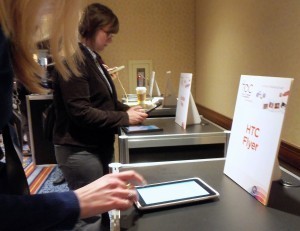
In ToC 2012's Digital Petting Zoo, 15 February.
Wikert's first-ever Digital Petting Zoo, in fact, made that problem more interesting than the devices lassoed to their pedestals. I'd like to have seen it turned into a repeated session in which, say, 30 attendees could enter at a time and be talked through the issue of proliferating ebook standards, illustrating the disparity with the devices at hand.
Instead, on my visit, some of the devices were accompanied by their sponsors' reps.
For example, I found friendly Rafiq Ahmed of Richard Nash's session Baby and the Bathwater: New Publishing Models Incorporating the Best of Old Publishing Practices. Here are the PubSlush presentation slides from that session. Ahmed hoped to snag some interest in his Demibooks Composer code-free application for making interactive iPad books on the iPad itself.
ToC: Shall we call this one 'librasion'?
There was, naturally, a "keynote" on the libraries' crisis. Barbara A. Genco of the Library Journal didn't throw any hymnals at our heads during her 10-minute preso, Public Library Power Patrons Are Your Best Customers (includes video and slides), but I wouldn't have been surprised if "The Battle Hymn of the Republic" had been piped in under her.
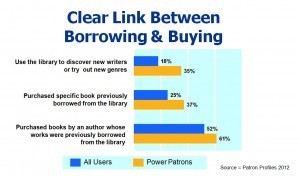
From Barbara Genco's ToC presenation of Bowker and Library Journal info about library "power patrons.'
Genco's mission was to use good numbers to tell publishers about what she calls the Power Library Patron who gets to the library at least weekly and is, according to Genco's Bowker-fueled presentation:
61% female
Age 48
Making $61,000
62% college- (or higher) educated
39% with kids under 18
Dianna Dilworth at GalleyCat has more on Genco's monologue in How Library Power Users Help Publishers.
A full session called The Library Alternative gave us a robust panel of strong personalities approaching the "mad as hell" stage. Here was Micah May of the New York Public Library talking almost from Tuesday to Wednesday about his concerns.
Panel moderator Peter Brantley, of the Internet Archive's BookServer project, ever eloquent in his defense of all things library, made it clear that librarians see themselves and their patrons as innocents caught in the crossfire between publishers such as Penguin and the digital distributor which has used Amazon to fulfill lending orders, OverDrive.
Brantley went so far as to mention talk of class-action suits, ever so briefly and without assigning names or organizations to the idea.
He ushered in comments from Andrew Albanese, Julie Sandorf, and Tim Coates of the Bilbary international ebook venture.
conf conflict betw #toccon and #dbw demos diff in serving both old + new publishing; excite/possibility of old embracing new is mostly gone.[image error]about 5 hours ago via TweetDeck Reply Retweet Favorite Peter Brantley
Calvin Reid at Publishers Weekly has more for you on this in TOC 2012: LeVar Burton, Libraries and The Bookstore of the Future.
And as soon as ToC had closed, here came 9 Rings, 8 Planets, 7 Dwarfs, 6 Publishers from Marlene Harris — an effort to help educate library patrons about why they may not know the name of the key publishers withholding ebooks from lending services, and introducing each house and its imprints. As she writes:
What we know are their books. When there is a title that patrons want, and we can't buy it, that's when we are reminded who the "Big 6″ are.
We're posting all the speaker slides as we get them to http://t.co/0IAdQtQx (keep in mind not all speakers share slides) #toccon[image error]about 22 hours ago via HootSuite Reply Retweet Favorite Tools of Change
ToC: Credit where due
Staged with the grace of a fresh reboot by O'Reilly Media's Kat Meyer, this year's trot of the digi-faithful around the lithium altar put some 1,500 attendees through more than 60 sessions. ToC 2012 was perched on several floors of the Marriott Marquis on Times Square.
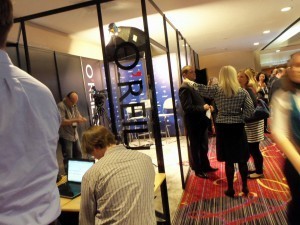
The interview cage at ToC this year was situated among exhibition booths. Photo: Porter Anderson
The conference's "exhibition hall" of sponsored show-and-tells this year kept free brochures and nattering demo busy. In down moments, company reps retreated to their own devices in booths clustered around the elevator core of the post-Jetsons hotel.
Many of us, of course, were also at the Digital Book World Conference + Expo last month at the Sheraton and creature-comfort confab-comparisons could be heard from start to finish at ToC.
While there's no need to cloud the Ether with those considerations, one thing can certainly be said, I think, without fear of contradiction: When it comes to food service and refreshments, ToC simply eats DBW's box lunch unboxed. At ToC, we sat at luncheon tables like ladies and gentlemen after serving ourselves from long buffets, and we were entrusted with genuine cutlery and cloth napkins, courtesy each day of another O'Reilly sponsor. No squatting in hallway corners with box lunches as at DBW. No drinking from soda cans like mall rats. No bartering for apples with brownies.
Lest our great, good friends at DBW feel bad, however, let's hasten to say that at the Marriott, as at the Sheraton, the production staffers show a remarkable fondness for presenting speakers in the darkest parts of many ballrooms. It's hard to fathom this zeal for dimming our wittiest icons so crudely.
Maybe that's what you get at a hotel with a Broadway house built into it. Everybody's a critic.
I'm a real critic, however, with a track record of more than 332 years on the aisle, and I'm here to tell you that you'd never have known that Meyers' colleague Wikert was on his first outing as co-chair.
He presided with Meyer over the software swirl apparently without fatigue. I want a list of Joe's prescriptions, is that Big Data? Even better, he took an authoritative lead role in many sessions, either as a panelist or moderator and, late in the game, as an especially quick keynoter, to tell us the happy news that O'Reilly — which long has offered its authors their own portal for data about their sales — will begin paying royalties to its writers monthly rather than quarterly.
Clearly my body has reached the stage of use it or lose it. Being in conference for 3 days has me limping today. #iamold[image error]about 5 hours ago via TweetDeck Reply Retweet Favorite ljndawson
ToC: One programming malfunction
There was a single moment in Tuesday afternoon's keynotes in which oil followed water on stage in a highly entertaning way. Nobody's fault, these things happen. We simply heard from both the light and the darkside (no, not you this time, Baratunde) in rapid succession.
First, we had O'Reilly author Clay Johnson, plugging his The Information Diet (can you believe it has no index at the back?). His book tells us that "today's media — Big Info — give us exactly what we want: content that confirms our beliefs." This is another formulation of the The Filter Bubble if you're Eli Pariser, or Beyond the Echo Chamber if you're Jessica Clark. We've all written this book, of course — mine's called My Either Is Better Than Your Ether — but Johnson is particularly entertaining in talking about it, and he's O'Reilly's boy and ToC is O'Reilly's show, so there he was, saying such things as:
Media managements know that we'll click on info-tainment. Pizza tastes better than broccoli.
Lacking editors and anything useful to do, the tech press has decided to exclusively report on its own tail. #beuseful #jackasses[image error]February 14, 2012 8:30 am via TweetDeck Reply Retweet Favorite Clay Johnson
He was immediately followed by Steve Rubel of Edelman and the Clip Report. Rubel reminded us that Edelman is the world's largest independent public relations firm. I don't know why we didn't all run screaming out into Shubert Alley right then. Probably we were too loaded down with yummy sponsored eats from lunchtime (not pizza) — not to mention Ms. Meyer's clever Valentine desserts at coffee break.
But it's fair to say that Rubel brought the #TOCcon Twitter stream to a near standstill, the only time that happened, with a whiplash of a message. The title of Johnson's gracious eight minutes or so had been Is SEO Killing America? Rubel's advertised Insights on the Future of Media insisted that it's SEO that has helped "the media claw its way back to relevance."
Not only is "media" still a plural word, damn it, but Rubel says the industry is at "a dynamic inflection point." That's one to save and use at parties, is it not? I say that every day of my life and I'm sure you do, too. He went on to assert that the media have discovered how to keep their output "relevant." Through SEO.
Hilarity ensued.
#toccon This talk is a great example of SEO killing america.[image error]February 14, 2012 4:53 pm via Echofon Reply Retweet Favorite eric hellman
ToC: Three A's to consider
One missing A: Authors
In coming days, I'll have more on ToC in the O'Reilly newsletter, and I'll be adding to this edition of the Ether on a variety of topics.
But before leaving ToC now, I'd like to mention three elements — two were missing, one was a great presence. Each starts with the letter A.
First. Authors. They were largely missing. Except for a small group of speakers, plus our friend Tobias Buckell, who gave one of the five-minute Ignite ToC sessions on the first evening.
With ticket prices that can approach $2,000, ToC is another conference simply not meant for authors. Most attendees are their on their companies' dimes, and they are members of the production end — technologists, publishers, designers, innovators, inspi-vational speakers, some agents, some editors, the professional core.

The most important display in the ToC exhibition area.
Here is an industry strangely resting on its hope that an army of mostly amateur self-styled "creative" people flung as far as the National Kitchen Table will reach, will somehow offer up the next masterpiece. And when it comes time to share the formidable realities of a business all but melting down under the "abundance" that Brian O'Leary tells us about so faithfully?
Authors are left out. Left out of expert conference discussions of, among other things:
ePub
publishing sector investors
consumer attitudes about e-reading
an "insight-oriented publishing environment"
global market access
"monetizing meaningful engagement with content"
print-to-digital publishing models
"hybrid" publishing employees
I'm going to say the following extremely carefully, and I want you to read it that way. I do not want to be misunderstood or misinterpreted on this. Watch well how I put this:
I believe (i.e., this is my opinion only, do I look like a committee to you?) that the publishing industry (in the abstract, no one stone is being throne here) has created what appears to be (as in it may not be, but it sure looks like) an attitude of disdain for authors.
Authors certainly experience it this way. This is why we have such Kon-wrathful spasms of apocalyptic invective as Amazon Will Destroy You, which was posted on Monday as ToC opened its workshops day, by (who else?) self-publishing ayatollah Joe Konrath.
More importantly, it's how it looks when our major conference organizers fail to find a way to offer the most promising, forward-leaning, Big-Data-ready, lucution-capable writers what they need to be good for the industry.
ToC, mind you, is the best in this regard. Notice how much of their programming they streamed, free (not "for free," damn it) on their site during the conference. And presentations and videos from the whole thing are being compiled and added daily, this is the page to watch, and I really appreciate the O'Reilly operation making so much of its material available. It's writers' turn to respond by stepping up and consuming as much of this as possible.
And, on the subject, DBW has mounted material from its conference as well as other good pieces at DBW Updates.
Yes, there are writing conferences. But they focus on craft courses. Writers also need outfits with the power and sophistication of O'Reilly and Digital Book World to include them in the industry, not relegate them to the hothouse of occasional accidental success that is authoring today. From keynotes to sessions on managing, making, and marketing, most authors are missing inclusion in their own industry's central moments.
Jane Friedman, my host here, Dan Blank, several others, do their best to get business heads onto creative shoulders anytime they can. During ToC, in fact, agent Rachelle Gardner moved a three-part comparative piece on what publishing can learn from Kodak. The links:
Part 1: Do You Know What Business You're In?
Part 2: Do You Know Your Customer?
Part 3: Are We Ready for Change?
But when Berlin's Fabienne Riener, who makes open-source software for news people, released her SourceFabric Booktype platform for digital books at ToC? — journalist-authors who might be starkly interested in it were not there to see. When Kathy Meis took, Pappus, her social-media outreach program for books, into ToC's Startup Showcase, authors weren't there to see.
So I'd be glad to see a day when ToC Almighty and ToC Bologna and Mini ToC Austin and Mini ToC Chicago and Buenos Aires, could be joined by ToC Authors. Kat Meyer has every right to kill me for suggesting this. She has more to do than the rest of us can guess to try to create the events already in the system.
If you ever think it's something you can consider, Kat, I'll work with you on ToC Authors.
RT @about 18 hours ago via TweetDeck Reply Retweet Favorite Kat Meyer
Another miss
I didn't get tickets to the 136th Westminster Kennel Club Dog Show.
some of those dogs on the Westminster Kennel Club Dog Show have better hair that I do! #notright[image error]February 14, 2012 9:46 pm via web Reply Retweet Favorite Diana
Another missing A: Amazon
Again, I'd like to be clear, careful, and as respectful as I can possibly be in the light of how accomplished Wikert and Meyer and everyone behind ToC are. I have nothing but the highest regard for them all. For all I know, they, too, would like to have had some presence from Amazon at ToC this year. For all I know, they invited Amazon to be involved and got no uptake. For all I know, they may have made a careful and purposeful decision not to include an Amazon presence — in which case, I bow to their deeper understanding of their goals and needs, confident that they made the right decision for their shop.
What I do know, however, is that when DBW had Amazon's Russ Grandinetti speak at the conference in January, it was a good move. It's not a question of whether Grandinetti or another representative of the company stuns us with transparency (not bloody likely, Mr. Shaw), or lets down her or his hair with us at happy hour (I want pictures).
It's the power of inclusion. We could sure use some.

The Broadway Ballroom gets a soundcheck before a plenary session at ToC 2012.
There are many ways to look at Amazon, and in publishing, not many of them are nice these days. But as Don Linn has reminded us (not in relation to this conference, just as general policy), hating Amazon is not a strategy. And I'd prefer to know more about this entity, if it's nothing more than how it shakes your hand. Cross-country sniping from New York at the Unmentionable Seattle Company has gotten us nowhere.
Since when was open, frank, assiduously honest but respectful dialogue not helpful, at least in getting a chance to hear how the other side dodges a debate? I learned a few things about Amazon when Grandinetti spoke. Of course he didn't break down crying and spill all the numbers the Bezosians keep to themselves. But just watching how he described the Amazonian viewpoint without the pertinent numbers was an education.
So enough. My point's clear. I think that in publishing we can ill afford a standoff with anybody. It's bad enough between the militant wing of self-publishing and the Big Six. I hope that in the future, all our major conference organizers will at least consider whether there might be a place on an agenda for a little inclusion. Then ask. All they can say is no. And hell, when DBW asked, they said yes.
Sitting across from Joan Rivers at the Delta Sky Club at LaGuardia. She hasn't commented on my wardrobe yet.[image error]February 15, 2012 11:55 am via TweetDeck Reply Retweet Favorite Don Linn
One fine A: An Agile presence
We all were pretty tired, I'm sure, by the time we reached late-morning Wednesday and the ToC session called Real World Agile Publishing. But what a hopeful, promising kick it turned out to be.
Brett Sandusky of Macmillan moderated, and he had both Wikert and Dominique Raccah, publisher of Sourcebooks as his two panelists — two folks genuinely interested in nurturing good work and in being an element of writers' efforts to produce it.
For her part, Raccah started with the disconnect so many writers feel when editors, cover designers, marketing people, all come into play with important roles of their own. As she put it:
When you're an author, a frustration occurs the moment that author hands you the manuscript. I asked the question, "Could we create a better author experience?"
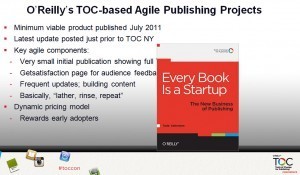
A slide from Joe Wikert's presentation at ToC about O'Reilly's work in Agile Methodology.
Wikert likes to call the Agile approach a matter of "paving the road under us while we're changing a tire as we're rolling down the road," By iterating in smaller cycles of development — and then testing the effectiveness of those smaller cycles before moving on — "there's going to be a whole lot of learning that occurs, and more opportunities."
An author needs a thick skin to handle the approach, Raccah cautioned. Both she and Wikert stressed that getting the right match of an author to the methodology is essential. But as Sandusky added, once the iterative process is moving along, the author is creating a whole suite of material around the project, not simply writing the book.
Raccah mentioned that she's uncertain how one finishes a project in this rolling format — and that she has been surprised to find one of her writers of fiction who wants to try applying Agile. Neither she nor Wikert sugar-coated the realities of the concept.
But it was a conversation about an intriguing way of working that may have a lot of application to the current interest in shorter form work, in "singles," and in the search for collaboration for many in a publishing space that looks pretty rigid too frequently. A smart and thoughtful entry in a conference of many insights.
Watch for more of the session when it posts, and for now, Wikert has his slides on the page for you.
#TOCcon: Is there not a tool that allows you to alter your twitter image with each post? I love looking at @February 15, 2012 2:36 pm via TweetDeck Reply Retweet Favorite PubPerspectives
Porter Anderson is a Fellow with the National Critics Institute, and a producer and consultant formerly with the United Nations World Food Programme in Rome and INDEX: Design to Improve Life in Copenhagen. As a journalist, he has worked with media including three networks of CNN, The Village Voice, and D Magazine. He reviews literary fiction, is a regular contributor to Writer Unboxed, and is based in Tampa .
February 15, 2012
2 Ways to Make the Most of Goodreads
I really admire the folks at Goodreads, not just for their site, but also for the data they share with the industry, including tips for authors. (If you're not familiar with Goodreads, imagine a Facebook for people who love to read books.)
The recent Goodreads author newsletter offered a number of gems helpful for any author with an upcoming release. Unfortunately, they don't seem to archive their author newsletters online, so I'll have to summarize what they said.
(And if the Goodreads people are reading this: Please, please, please archive your newsletters with this information. I'd be tweeting and sharing it if you did.)
1. Reviews are essential.
No surprise there, right? The same is true of Amazon. According to Goodreads, reviews on their site help your book stand out in two ways.
They help new readers discover your book. The more people review your book, the more visible it will be. Goodreads reviews also appear on sites like Powell's, Google Books, and the Sony Ebook Store.
They help readers take a chance on an unknown book. Goodreads says, "Books with no written reviews are added, on average, by 7 people, while books with just five written reviews are added by more than 40 people."
2. Giveaways are a powerful promotional tool.
According to Goodreads, here are the top techniques behind successful advance giveaways.
Give away as many copies as possible. This goes straight back to Point No. 1. Goodreads says, "If your goal is to get reviews, it makes sense to give away a lot of books. Nearly 60 percent of giveaway winners review the books they win, so the more books you offer, the more reviews you are likely to get."
Run your giveaway for two weeks to a month. Goodreads says, "Giveaways less than two weeks run the risk of not getting enough entries, while a four-week giveaway will generate more entries. We recommend that you offer giveaways for one month."
You can run a second giveaway. Goodreads says, "We recommend two giveaways: one about three months before publication to build prerelease buzz and reviews, and a second to increase awareness when your book hits stores. Both will result in a lot of people adding your book to their to-read shelves."
Goodreads also mentioned that when Diana Gabaldon used their "giveaway widget" for a recent giveaway, it attracted more than 5,000 entries. Plus interest in her other titles spiked at the same time. Goodreads also encourages the use of ads to spike giveaway entries. (Giveaways with ads get more than 50% than average response.)
Keep in mind—what's true on Goodreads is probably true for campaigns you might be running on your own site. But if you're not already active on Goodreads, you should give it a shot. (Go visit my author page to get started and get a feel for what it's like.)
Do you use Goodreads? Have you used it for author marketing and promotion? If so, I hope you'll leave a comment about your experience.
February 10, 2012
10 Questions to Ask Before Committing to Any E-Publishing Service
With an avalanche of new services promising to help writers self-publish or distribute their e-books even better and more profitably before, it's imperative that writers educate themselves about how these services typically operate—plus read the fine print of any new service before deciding to commit.
Note that when I discuss "services," they typically fall into 2 categories:
single-channel, retailer-driven services (e.g., Amazon's Kindle Direct Publishing, Barnes & Noble's PubIt, and Apple iBookstore)
multiple-channel distribution services that often include some kind of formatting and conversion service; sometimes these distribution services sell e-books, too. BookBaby and Smashwords are two of the most well-known and recommended services.
… and there are also other types of services, such as those offered by agents or even traditional publishers.
Here are 10 questions you must ask of any new service you consider using.
1. Is the service exclusive or nonexclusive?
E-publishing services marketed directly to authors almost always operate on a nonexclusive basis. That means you can use their service to sell your e-book while also selling your e-book anywhere else you like (or using any other service).
There are two notable exceptions right now:
E-books created with Apple's iBooks Author tool (available only to Mac users). This only applies if you plan to charge for your iBook. If your Apple iBook is made available for free, you are welcome to distribute anywhere and everywhere outside the Apple iBookstore. There's another important caveat about this under #7.
Self-published e-books made available for lending through Kindle Select. Amazon asks for a 3-month exclusive if you join the Kindle Select program (which allows your book to be lent out to Kindle users). If you want to read more about this option, click here for an excellent analysis by Carolyn McCrary.
2. If it's exclusive, what's the term of the contract?
If you're working with an agent to publish your e-book, you will likely be asked to sign a contract that has a 2- or 3-year term. This is simply to ensure that, after your e-book files are prepared, your cover designed, and all ducks put in a row, that you don't suddenly change your mind and take your e-book elsewhere. There are sufficient upfront costs that the agent needs to be confident of recouping their initial outlay. I recommend you not commit for longer than 2 or 3 years due to how fast the market conditions can change for e-books.
3. Do you control the price?
While some services may have reasonable pricing restrictions (e.g, not allowing you to price below 99 cents), standard practice is to give the author complete control over pricing.
Caveat: Most e-book retailers mandate that you not offer more favorable pricing anywhere else (whether at another retailer or direct-to-consumer from your own site). Amazon in particular is known for carefully policing this and will automatically lower the price of your e-book if they find you pricing it lower somewhere else. (Some authors use this to their advantage and make their e-book available for free elsewhere so Amazon will then push the price of the Kindle edition to free, which is tricky to accomplish through other means.)
4. What's the upfront fee and/or how is the royalty calculated?
While different services have different models, the fees should be transparent and upfront. For example:
Amazon Kindle, Barnes & Noble PubIt!, and Apple's iBooks are all free to use. They make their money by taking a cut of your sales. Usually you earn 60-70% of your list price (assuming you price in the range they specify).
Smashwords is free to use and distributes to all major e-book retailers except Amazon. Smashwords pays you 85% of your list price on sales directly through the Smashwords site, minus PayPal transaction fees. They pay you 60% of your list price on sales through retailers (in other words, they take 10% after the retailer takes their cut).
BookBaby offers conversion services and distributes to all major retailers. It costs $99 up front, plus $19 every year thereafter. You earn 100% net—BookBaby keeps no commission. It makes its profit on the upfront fee that you pay, as well as other fee-based services.
Always, always, always read the fine print in these cases. For instance, if you price your book very low (99 cents), and there's a 25-cent transaction fee for each of your sales, you've just cut into your profits even if you're earning 70% or 80% of list.
Unfortunately, I'm starting to see less transparency in how payments work. For instance, a new service from AuthorSolutions called BookTango is very deceptive in its marketing. It claims to offer free e-publishing services PLUS 100% royalties. First of all, that's only if the sale is made on their site. Second, in the case of such sales, there's a 30% "bookstore fee," meaning you're getting 70%, not 100%. (Click here to see for yourself.)
5. Are there hidden fees or charges?
You can end up paying more than standard rates for conversion/formatting if your book runs very long, if you have an inconvenient file format that needs extra work (common with PDFs), if you have a lot of chart/table/image formatting, and so on. If your work has any kind of "special needs," expect a service to charge you more. (The best services, such as BookBaby, are very specific about what these costs will be.)
6. What file formats do they accept?
This is critical to know upfront because it usually determines (1) whether or not you can use the service in the first place and (2) how much you'll get charged for formatting and conversion if that's a service you need.
A few things to know:
Microsoft Word (or any text file) is commonly accepted. However: If you're publishing direct to Kindle or Nook (or use Smashwords, which is automated too), unless you "unformat" your Word document, it is likely to look like crap on an e-reading device when automatically converted to an e-book format. (That is: Your e-book file may have converted successfully, but the formatting/styling is awful.) Most retailer's e-publishing services have extensive guidelines, preview programs, and other ways of ensuring things look OK before your e-book goes live.
EPUB is the industry standard e-book file format. If you want to create your own EPUB file, see the end of this post for recommendations.
Many conversion/formatting services typically offer you EPUB and MOBI files since that covers you on Amazon and just about any other e-book retailer.
PDF is one of the most difficult file formats to convert to EPUB. Expect to pay.
7. Who owns the e-book files after they are created?
It is ideal if you own the e-book files, and that is usually the case when you pay out of pocket for conversion and formatting services. In the case of some free services, such as Smashwords, you do not. (Why so? When you upload your Word document to Smashwords—the only format accepted—it goes through their "meatgrinder" conversion process to create a variety of e-book files. You then have access to those e-book files, but you're not supposed to turn around and sell them through other services.)
8. Are DRM protections or proprietary formats involved?
DRM stands for digital rights management. DRM is supposed to prevent piracy, or illegal copying and distribution of your e-book after is sold. However, I agree with those who argue that DRM is not reader- or consumer-friendly, and should not be used. The industry standard e-book format, EPUB, does not use DRM.
There are only 2 areas where you're likely to run into a proprietary format or DRM.
Amazon Kindle uses a proprietary format with DRM. If you use the Kindle Direct Publishing program to publish your e-book, no matter what type of file you upload, they will automatically convert it to their proprietary, DRM-locked format. However, because their service is not exclusive, you can always make your e-book available in other formats through other services, without restriction.
The Apple iBooks tool creates e-books in a proprietary format. No other device aside from an iPad or iPhone can view an e-book created by the Apple iBooks tool.
9. Where is your e-book distributed?
If you're using Amazon Kindle Direct, or Barnes & Noble PubIt!, the answer is pretty simple: Your e-book is distributed only through those specific retailers. When you use a multiple-channel e-book distribution service (such as Smashwords or BookBaby), then the mix of retailers they reach will vary. At minimum, you want to reach Kindle & Nook, since they currently make up about 85% of all e-book sales.
One common strategy among authors is to use Amazon Kindle Direct combined with Smashwords (which distributes to all major e-book retailers except Kindle). You can probably reach 95%+ of your market with that approach, if not 100%.
10. Can you make changes to your e-book after it goes on sale?
If you're working directly with retailers (e.g., Amazon and Barnes & Noble), you can upload new and revised files as often as you like—they don't care. Same goes with Smashwords. However, if you're using a multiple-channel distributor other than Smashwords, you will likely have to pay fees to make changes.
Single-channel services (retailers) I recommend
Amazon Kindle Direct Publishing
Barnes & Noble PubIt!
Distribution services I recommend
Smashwords
BookBaby
EPUB (e-book) creation tools I recommend
PressBooks
Sigil
Apple iBooks Author (for image- or media-driven e-books), just be aware of the exclusivity they demand
Still have questions? Leave a comment.
Jane Friedman
- Jane Friedman's profile
- 1882 followers



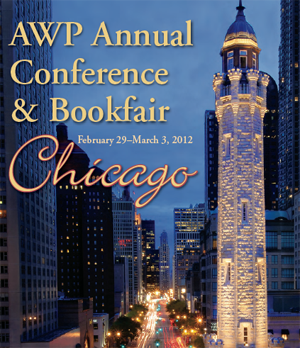
![Effective Website [Robert Hruzek / Flickr]](https://i.gr-assets.com/images/S/compressed.photo.goodreads.com/hostedimages/1384794091i/6964106.jpg)
